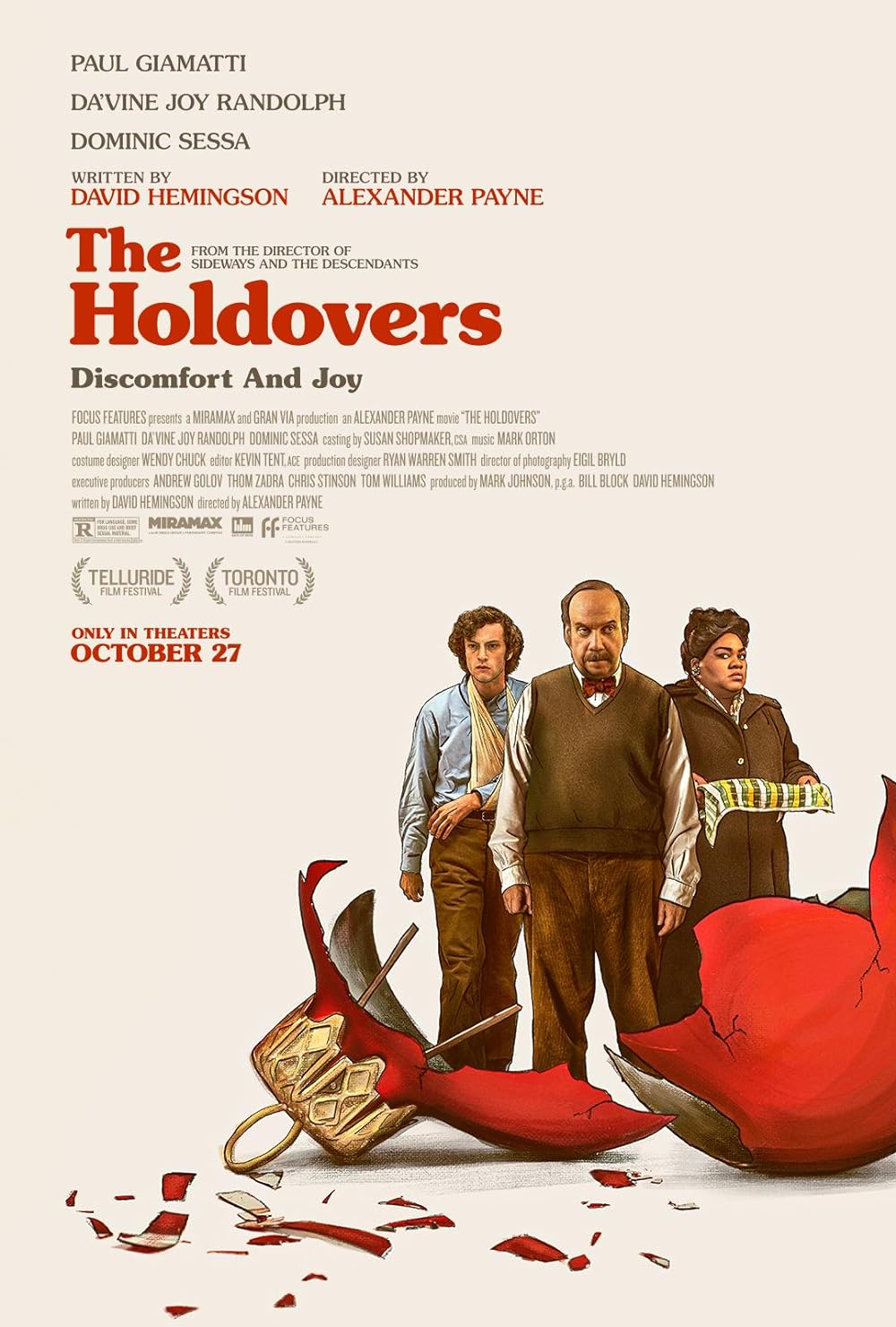The story is set in 1970 over the Christmas/New Year break at an elite boys’ boarding school in rural New England. (We gather it’s Massachusetts because the nearest big city is Boston.) The wonderfully unglamorous Paul Giamatti is Paul Hunham, an unhappy curmudgeon who teaches ancient history to a class of students he variously describes as ‘rancid vulgar philistines’ and ‘snarling visigoths’. I suspect these insults are translations from ancient texts; he’s often muttering rude asides in Greek or Latin. I took an instant liking to him.
Nobody at the college likes him. The staff don’t like him because of his rigidity and unsociability. The students don’t like him because he’s such a hard taskmaster, and he doesn’t spare their feelings when delivering poor marks. In an early scene he slaps their exam papers down one by one on their desks. Most are Fs or Cs. Only one boy gets a B, and even that’s followed by a minus.
The kids call him ‘wall-eye’ behind his back, because of his strabismus – a condition that makes it appear your eyes are looking in different directions. Paul Giamatti, I think it’s fair to say, is not a pretty face, so I was surprised to read that he doesn’t actually have it. The effect was achieved with a prosthetic glass eye.
As if that’s not scorn-inducing enough, he’s also called ‘fish’ because (as is later revealed) he has a medical condition which causes this offensive odor to develop during the day. No wonder he’s unpopular.
The headmaster – one of his own ex-students – is particularly down on him because he delivered a fail to the son of one of the college’s principal benefactors. To spite him, the headmaster appoints Hunham the ‘babysitter’ for the boys who for whatever reason have nowhere to go over the holiday, even though it’s not his turn.
This makes him even more cranky. It’s freezing cold, the surrounding landscape is covered in ice and snow, and to save money the college is turning off the heating in all but a few rooms and the holdover boys have to bunk in together in the infirmary. Could things get any worse? Yes. Hunham tells his already miserable charges that they have to do lessons as well as outdoor exercise.
One of the luckier lads pulls some familial strings to get himself and a couple of the other holdovers spirited away in a helicopter to a better festive season. Hunham is left alone with Angus Tully (newcomer Dominic Sessa), the smart but troubled child of divorced, neglectful parents. (He’s the one who got the B minus.)
They are not entirely alone. There’s also the head cook, a big black woman called Mary Lamb, whose son, a one-time scholarship student at the college, has recently been killed in Vietnam. There’s also the black janitor, even lower on the college pecking order than these misfits.
Hunham is not without redeeming qualities. He won’t put up with the casual racism and snobbery directed at the black servants by some of these privileged kids, and defends them with the same righteous indignation with which he refused the headmaster’s plea for him to go easier on the benefactor’s boy.
He’s also rather sweet on the pretty, kindly college secretary who includes him when distributing her home-baked colourfully-decorated Christmas cookies to the staff. He even begins to fantasise about her romantically when she invites him and Mary and Angus to her Christmas Eve drinkies and makes a warm welcome fuss over them.
The stage is set for a heartwarming tale about emotional growth, the forging of unlikely friendships and the getting of wisdom. When I saw the trailer for this movie I thought: no prize for guessing how this story’s going to unfold, but the writing, the acting, the dialogue and the characterisation all looked so good I decided to give it a go. There was also the allure of Alexander Payne as director.
Payne has directed some of my favourite American films. He previously directed Paul Giamatti in 2004’s Sideways – a road trip buddy movie set in the Californian wine country, in which Giamatti plays a pedantic English teacher, struggling writer and wine snob (pinot noir is his thing) who dimly understands that his hyper-critical attitude to life makes him his own worst enemy. He’s not unlike Paul Hunham.
Payne also made the wonderful About Schmidt (2002) which starred Jack Nicholson as an insurance assessor widowed and adrift at the start of his retirement. Payne seems to specialise in these poignant comedy/dramas about lost, disappointed middle-aged men, in stories that put his characters’ flaws and neuroses on full display, always mixing their misery with hope and never losing sight of their essential humanity.
I have a low tolerance for narrative cliché, but the storyline of The Holdovers is not as predictable as it sounds. I also have low tolerance for sentimentality and mawkishness, but The Holdovers manages – only just – to push itself up to that threshold without toppling over it. I did shed a tear or two at the happy/sad ending, but so did my slightly more hard-hearted companion. I loved it. We both did.

